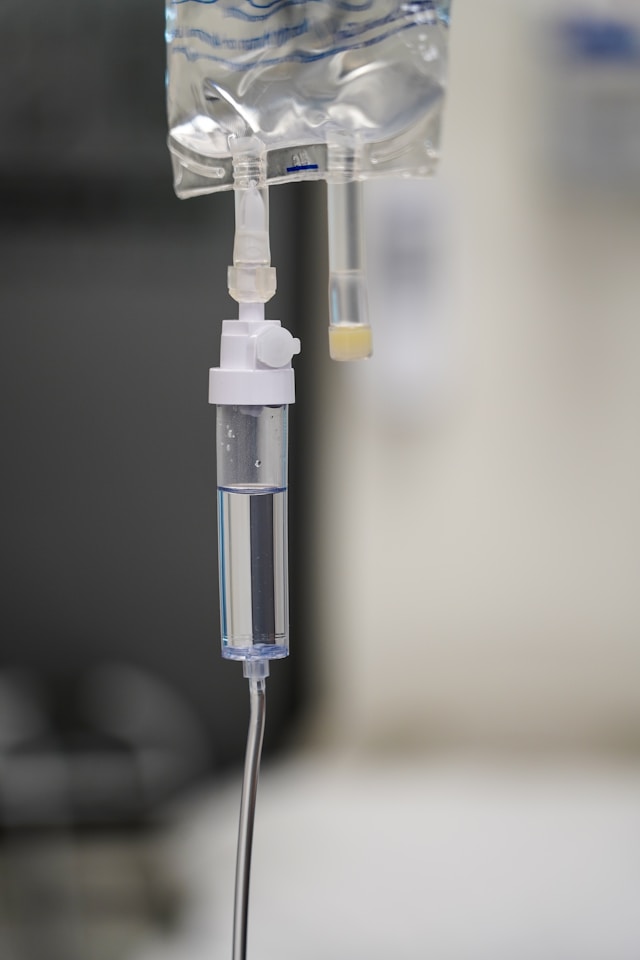
Biologics Delivered by Infusion (Overview)


Dr. Chen is a board-certified immunologist with over 15 years of experience treating autoimmune and immunodeficiency disorders. She specializes in IVIG therapy and has published extensively on immune system treatments.
Medical Disclaimer
Biologic medications have revolutionized treatment for autoimmune diseases, inflammatory conditions, and numerous other illnesses, offering targeted therapy that works with your body's own biological systems. Many biologics are delivered by infusion, providing powerful disease control through convenient periodic treatments. Understanding what biologics are, how they differ from traditional medications, and why infusion delivery is often necessary helps you appreciate this advanced therapeutic approach.
Key Highlights
- Biologics are medications made from living organisms or their components, designed to target specific disease mechanisms with precision.
- Common infusion biologics include TNF inhibitors (Remicade), B-cell depleting agents (Ocrevus), integrin blockers (Entyvio), and many others for autoimmune and inflammatory conditions.
- Biologics must often be given by infusion because they are large, complex molecules that would be destroyed by digestive enzymes if taken orally.
What Are Biologic Medications
Biologics (also called biological medications or biopharmaceuticals) are drugs made from living organisms or contain components of living organisms. Unlike traditional medications which are chemically synthesized, biologics are produced using biotechnology—typically manufactured in living cells (bacteria, yeast, or mammalian cells) that are genetically engineered to produce the desired therapeutic protein.
Common types of biologics include monoclonal antibodies (laboratory-made antibodies targeting specific molecules), fusion proteins (combining parts of different proteins), and immunoglobulins (antibodies pooled from donors). These are large, complex molecules—often hundreds of times larger than traditional chemical drugs.
According to the FDA, biologics represent some of the most advanced and effective treatments available for previously difficult-to-treat conditions.
Biologics vs. Traditional Medications
Size and Complexity: Traditional drugs are small chemical molecules (typically 100-1000 atoms). Biologics are large, complex proteins (tens of thousands of atoms). A traditional drug might weigh 200-500 daltons, while a biologic like infliximab weighs about 150,000 daltons.
Manufacturing: Traditional medications are chemically synthesized in predictable, reproducible processes. Biologics are produced in living cells, making manufacturing more complex and variable.
Mechanism: Traditional drugs often work broadly throughout body systems. Biologics typically target very specific molecules or cells, offering precision that often translates to better efficacy with fewer off-target effects.
Administration: Traditional drugs can often be taken orally. Most biologics must be injected or infused because digestive enzymes would destroy these large proteins.
Immunogenicity: Your immune system may recognize biologics as foreign and develop antibodies against them, potentially reducing effectiveness. Traditional drugs rarely trigger immune responses.
Cost: Biologics are significantly more expensive to develop and manufacture than traditional medications.
Why Biologics Are Given by Infusion
Digestive Destruction: Biologics are proteins. If swallowed, stomach acid and digestive enzymes would break them down into amino acids before they could reach your bloodstream, completely destroying their therapeutic structure.
Size and Absorption: Even if biologics survived stomach acid, they're too large to pass through intestinal walls into your bloodstream. Only small molecules can be absorbed from the GI tract.
Precise Dosing: IV infusion delivers exact doses directly into circulation, ensuring 100% bioavailability. Subcutaneous injection absorption is more variable.
Controlled Delivery: Some biologics require specific infusion rates to minimize reactions or side effects. IV infusion allows precise control.
Monitoring: Infusion settings provide healthcare supervision, allowing immediate response if reactions occur—particularly important for first-time administration of high-risk biologics.
While many biologics are now formulated for subcutaneous self-injection (offering home convenience), infusion remains necessary or preferred for numerous biologic medications.
Common Categories of Infusion Biologics
TNF-Alpha Inhibitors: Block tumor necrosis factor-alpha, a key inflammatory protein. Examples: Remicade (infliximab), Simponi Aria (golimumab). Used for rheumatoid arthritis, inflammatory bowel disease, psoriatic arthritis, ankylosing spondylitis.
Interleukin Inhibitors: Block specific interleukins (inflammatory signaling proteins). Examples: Actemra (tocilizumab) blocks IL-6; Stelara (ustekinumab) blocks IL-12/23. Used for rheumatoid arthritis, inflammatory bowel disease, lupus, psoriatic arthritis.
B-Cell Depleting Agents: Target CD20 on B cells, temporarily eliminating them. Examples: Ocrevus (ocrelizumab), Rituxan (rituximab). Used for multiple sclerosis, rheumatoid arthritis, certain autoimmune conditions.
T-Cell Costimulation Blockers: Prevent T-cell activation. Example: Orencia (abatacept). Used for rheumatoid arthritis, psoriatic arthritis.
Integrin Blockers: Prevent inflammatory cells from entering tissues. Examples: Entyvio (vedolizumab) gut-selective; Tysabri (natalizumab) affects CNS. Used for inflammatory bowel disease and multiple sclerosis.
CGRP Inhibitors: Block calcitonin gene-related peptide. Example: Vyepti (eptinezumab). Used for migraine prevention.
Immunoglobulin Replacement: IVIG provides antibodies from pooled donors. Used for primary immune deficiencies, CIDP, autoimmune conditions.
Bone-Targeting Agents: While technically not biologics by strict definition, some bone medications like Reclast (zoledronic acid) are given by infusion.
How Biologic Infusions Work
Each biologic has its specific mechanism, but general principles include:
Targeted Binding: Biologics bind to their specific target with remarkable precision—like a key fitting a specific lock.
Blocking Signals: Many biologics prevent inflammatory proteins from triggering their receptors, interrupting disease-causing cascades.
Depleting Cells: Some biologics mark specific immune cells for destruction, temporarily removing disease-causing cell populations.
Modulating Responses: Biologics can alter how immune cells behave, reducing harmful responses while preserving protective immunity.
Replacing Missing Components: IVIG replaces antibodies that patients cannot produce themselves.
The targeted nature of biologics often provides more effective disease control than traditional medications that work more broadly and less specifically.
What to Expect with Biologic Infusions
While specifics vary by medication, common elements include:
Pre-Treatment Requirements: TB screening, hepatitis testing, baseline labs, sometimes imaging. Ensures safe treatment initiation.
First Infusion Caution: Given slowly with close monitoring since reactions are most likely with initial exposure to new biologics.
Pre-Medications: Many biologics require pre-treatment with corticosteroids, antihistamines, or acetaminophen to reduce infusion reaction risk.
Varying Schedules: Some biologics are monthly (Tysabri), others every 8 weeks (Remicade, Entyvio), every 6 months (Ocrevus), or every 3 months (Vyepti).
Monitoring: Regular check-ins during infusion, vital signs, post-infusion observation.
Combination Therapy: Many biologics work better when combined with traditional immunomodulators like methotrexate or azathioprine.
Long-Term Use: Most biologic-treated conditions require ongoing therapy. Stopping usually leads to disease relapse.
Benefits of Biologic Therapy
High Efficacy: Biologics often provide better disease control than traditional medications, with many patients achieving remission or low disease activity.
Targeted Action: Precisely affecting disease mechanisms while sparing other body systems, often resulting in more favorable side effect profiles.
Novel Treatment Options: Offer hope for conditions poorly controlled by traditional therapies.
Disease Modification: Some biologics may alter disease course long-term, preventing irreversible damage.
Steroid Reduction: Many patients can reduce or eliminate chronic corticosteroid use when biologics achieve disease control.
Quality of Life: Effective control allows many patients to work, participate in activities, and maintain independence.
According to the American College of Rheumatology, biologic therapies have transformed outcomes for autoimmune disease patients.
Potential Challenges with Biologics
Infection Risk: Most biologics increase susceptibility to infections by affecting immune function. Severity varies by medication and mechanism.
Infusion Reactions: Particularly during first infusions, reactions ranging from mild (itching, flushing) to rarely severe can occur.
Immunogenicity: Patients may develop antibodies against biologics, reducing effectiveness or increasing reaction risk. Combination therapy can reduce this risk.
Cost: Biologics are expensive—typically thousands per dose—though insurance and assistance programs usually provide access.
Administration Burden: Requiring periodic infusions means scheduling appointments and spending time at infusion centers.
Limited Long-Term Data: Newer biologics have limited long-term safety information compared to decades-old traditional medications.
Storage Requirements: Many biologics require refrigeration and careful handling.
Biosimilars: Expanding Access to Biologics
As original biologic patents expire, biosimilar versions become available. Biosimilars are highly similar to the original biologic (called the reference product) with no clinically meaningful differences in safety, purity, or potency.
Examples include Inflectra and Renflexis (biosimilars of Remicade). Biosimilars typically cost 15-35% less than reference products, potentially improving access to biologic therapy.
The FDA applies rigorous standards for biosimilar approval, requiring demonstration that the biosimilar is highly similar to and has no clinically meaningful differences from the reference product.
The Future of Biologic Therapies
Biologic development continues advancing:
New Targets: Researchers identify novel disease-causing molecules that could be targeted with biologics.
Improved Formulations: Development of subcutaneous versions of IV biologics, extended-release formulations, and combination products.
Personalized Medicine: Better understanding of which patients respond best to specific biologics, allowing more tailored treatment selection.
Bispecific Biologics: Designed to target two different molecules simultaneously, potentially offering enhanced efficacy.
Gene Therapies: While distinct from traditional biologics, gene therapies represent biological approaches to treatment.
Frequently Asked Questions
What is the difference between biologics and biosimilars?
Biologics are the original biological medications developed and approved through extensive clinical trials. Biosimilars are highly similar versions of original biologics developed after patent expiration, proven through comparative studies to have no clinically meaningful differences in safety, purity, or potency. Biosimilars work identically to original biologics but typically cost less. Think of biosimilars as the biologic equivalent of generic drugs, though the approval process is more rigorous due to biologics' complexity.
Why are biologics so expensive?
Biologics require sophisticated manufacturing in living cell systems, unlike traditional drugs synthesized through chemical reactions. Development costs are enormous—years of research, extensive clinical trials, and regulatory approval processes. Manufacturing requires specialized facilities maintaining sterile conditions and rigorous quality control. Each batch must be tested extensively to ensure consistency. Despite high costs, insurance typically covers biologics for approved conditions, and manufacturer assistance programs help patients access treatment.
Can biologics cure autoimmune diseases?
Biologics do not cure autoimmune diseases, which are chronic conditions. However, biologics can induce remission—meaning disease activity is minimal or absent while treatment continues. Some patients maintain remission for years on biologic therapy, experiencing normal or near-normal quality of life. Stopping biologics typically leads to disease relapse, so ongoing treatment is usually necessary. The goal is disease control rather than cure.
Are biologics safer than traditional immunosuppressants?
"Safer" depends on the specific comparison. Biologics' targeted action often means fewer broad side effects than traditional immunosuppressants affecting many body systems. However, biologics carry their own risks—particularly infection susceptibility and potential for infusion reactions. Long-term safety data is more extensive for traditional medications. Your doctor weighs each medication's specific risk-benefit profile for your individual situation.
How long do you need to stay on biologic therapy?
Most autoimmune and inflammatory conditions requiring biologic therapy need ongoing long-term treatment. Stopping biologics typically leads to disease relapse within weeks to months. Some patients who achieve prolonged deep remission may attempt treatment withdrawal under close supervision, but relapse risk is high. Think of biologics like blood pressure medication—ongoing treatment maintains disease control. The excellent outcomes many patients achieve on biologics make long-term treatment worthwhile for most.
Advanced Therapy for Complex Conditions
Biologic infusion therapy represents remarkable medical progress, offering targeted treatment that has transformed outcomes for countless patients with autoimmune diseases, inflammatory conditions, and other complex illnesses. These sophisticated medications work with your body's biological systems to precisely target disease mechanisms.
For many patients, biologics have provided disease control that wasn't achievable with traditional medications, allowing them to reclaim their health and quality of life.
Ready to explore biologic infusion options for your condition? Find infusion centers near you specializing in biologic therapy and supporting patients through their treatment journey.
Medical Disclaimer: This content is for educational purposes only and is not a substitute for professional medical advice, diagnosis, or treatment. Always consult your healthcare provider with questions about your medical condition or treatment options.
Article Statistics


Table of Contents
Article Statistics










